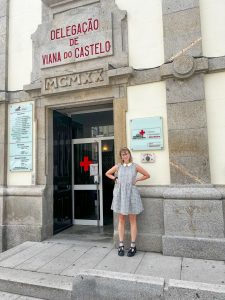 Lately, I’ve been thinking about an article I read by Steve de Gruchy, an author specializing in theology, ethics, and philosophy. The title is “Dealing with Our Own Sewage: Spirituality and Ethics in the Sustainability Agenda.” The primary purpose of the article is to emphasize the severity of the freshwater crisis, and how everyone must do their part to live more sustainably. One phrase from de Gruchy’s article keeps echoing in my mind: We all live downstream. So, how does this relate to my CAPS fellowship?
Lately, I’ve been thinking about an article I read by Steve de Gruchy, an author specializing in theology, ethics, and philosophy. The title is “Dealing with Our Own Sewage: Spirituality and Ethics in the Sustainability Agenda.” The primary purpose of the article is to emphasize the severity of the freshwater crisis, and how everyone must do their part to live more sustainably. One phrase from de Gruchy’s article keeps echoing in my mind: We all live downstream. So, how does this relate to my CAPS fellowship?
When recognizing that we all live downstream, one will realize that our decisions have resounding effects everywhere. Our choices do not affect just us– there are people “downstream” who will experience the ramifications of our actions. In his article, de Gruchy specifically uses this metaphor to describe water pollution. Earthly resources are finite; if we pollute the water here, it will eventually make its way to someone else, who now does not have clean water. The reality is that the ones most affected by water pollution are the disenfranchised and marginalized. It is easy to turn a blind eye when you, yourself, do not experience the consequences. Currently, in my life, I am seeing this metaphor everywhere I look.
The state of our planet, both environmentally and socially, has been stirring a rather hopeless feeling in me. Being a white woman in a developed country, I am relatively “upstream.” Not every day do I have to face all of the crises in the world– and there are many. So that we are on the same page, here are a few: the mass shooting epidemic, the climate crisis, animal genocide in agriculture, world hunger, war, the freshwater shortage, inflation, infectious disease, and the refugee crisis. That is a lot for a 21-year-old girl to face; however, that is the problem– most of us do not face it. We turn a blind eye, brush it off, and move on. We post a “I stand with Ukraine” tweet and then go take a nap.
 Now, what I am not saying is that we all need to rise up and fix these issues all at once. That is impossible. What I am saying is that we cannot succumb to cognitive dissonance anymore. We all live downstream– so all of these issues? They’ll make their way to us. David Korten, an author and former Harvard professor, puts it like this: “we live on a spaceship, not an ocean liner. A spaceship has no lifeboat. Its occupants either prosper or perish together.” These statements may induce panic, but de Gruchy’s article does not end with a doomsday perspective. He doesn’t turn a brush off the issues either, though (that would be very ironic). He says this: “ [we have] the responsibility to tend one’s garden, respect both the neighbor and the stranger, and deal with one’s own sh*t.”
Now, what I am not saying is that we all need to rise up and fix these issues all at once. That is impossible. What I am saying is that we cannot succumb to cognitive dissonance anymore. We all live downstream– so all of these issues? They’ll make their way to us. David Korten, an author and former Harvard professor, puts it like this: “we live on a spaceship, not an ocean liner. A spaceship has no lifeboat. Its occupants either prosper or perish together.” These statements may induce panic, but de Gruchy’s article does not end with a doomsday perspective. He doesn’t turn a brush off the issues either, though (that would be very ironic). He says this: “ [we have] the responsibility to tend one’s garden, respect both the neighbor and the stranger, and deal with one’s own sh*t.”
Again– what does this have to do with my CAPS fellowship? The American Red Cross is known for their humanitarian efforts. It is easy to feel like you’re not doing enough when you’re watching the work of such a large organization. What I learned from the de Gruchy article is this: it takes the efforts of many, not just one. The American Red Cross does amazing things, and I am just one piece of the puzzle. Even still, I am an important piece. To be complete, a puzzle needs all of the pieces. This is true in my fellowship, but also of the world. It is easy for me to beat myself up that I’m not doing enough. One person can’t do everything though– as de Gruchy said, we just need to deal with our own sh*t.
I’m having a great time with my internship, by the way.
– Victoria Cammarano, American Red Cross